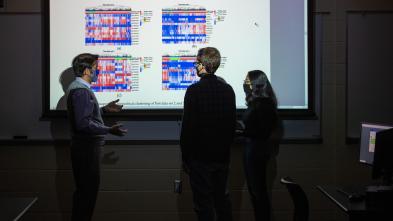
Artificial Intelligence
Artificial intelligence is rapidly evolving, and it's here to stay. Explore the potential of harnessing this powerful tool within a range of industries and disciplines.
On the Cutting Edge
Through studying artificial intelligence at UWEC, you'll not only learn key technical skills for data analysis and model evaluation, but you'll also explore the ethical and societal challenges with AI algorithms and potential biases. Through coursework and realistic projects, you'll gain a foundational understanding of the integration of AI in the workforce — and in society at large.
Within the major, you'll have two choices: you can pursue a 60-credit comprehensive major or a 36-credit standard major. The comprehensive AI major is more technically rigorous and aims to prepare students for STEM-oriented careers. The standard major is designed for students interested in careers in the social sciences, humanities, healthcare, and business sectors.
Program Details
Blugold Stories
Justthe
facts

Where can the artificial intelligence program lead me after graduation?
Graduates will be prepared to analyze datasets and develop AI models and algorithms. They will learn to drive operational efficiency and decision-making across key industries like healthcare, journalism, finance, and manufacturing.
Example Careers
- Data scientist
- Market research analyst
- Database architect
- Statistician
- Operations research analyst
Blugolds studying artificial intelligence will take a blend of courses, including topics in data science, mathematics, and AI. You'll have the opportunity to select courses that are of the most interest to you and your career goals.
Here are a few courses in Artificial Intelligence at UW-Eau Claire.
CS 245
Advanced Programming and Data Structures
Advanced object-oriented programming techniques including OO design, distributed and concurrent computation, GUI development, and testing. Implementation and use of data structures including lists, stacks, queues, trees, and graphs.
CS 252
Computer Systems
Introduction to systems level concepts including number system representation, digital logic, machine models, assembly language, UNIX, C programming and memory management, and parallel architectures.
CS 335
Algorithms
Discussion of algorithm design, problem-solving methods. Specific algorithm topics include divide-and-conquer, dynamic programming, and backtracking.











